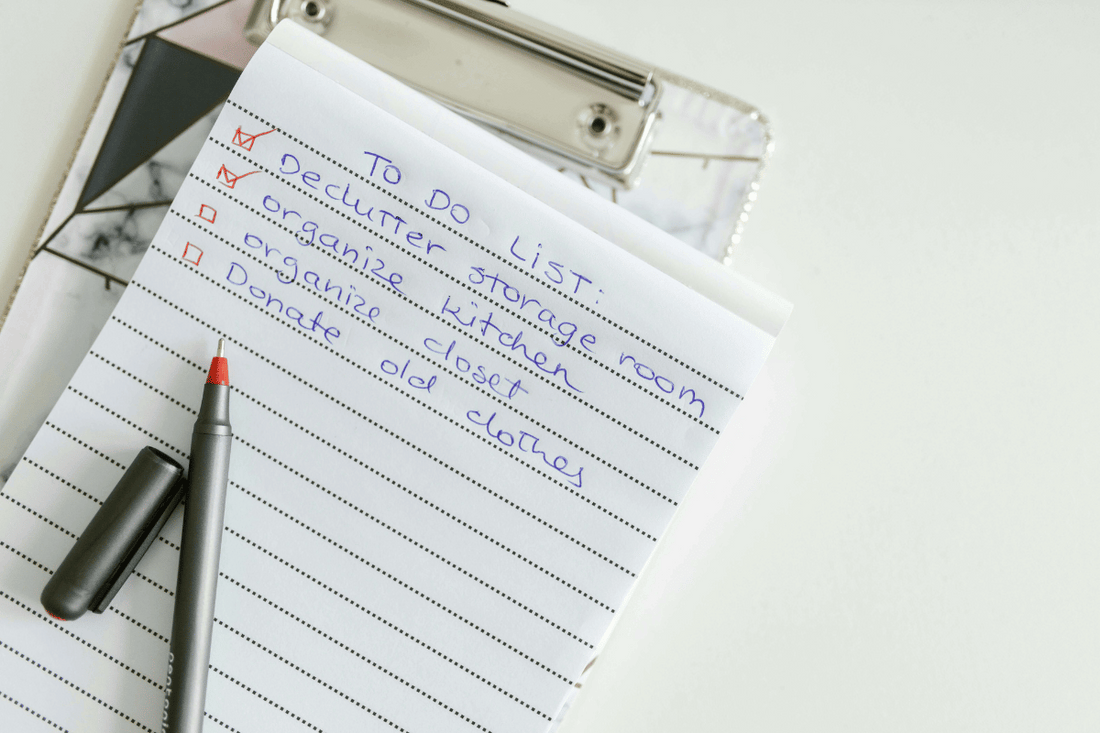Growing up with ADHD, I've struggled with focus and productivity all my life. It made me feel inadequate at work, at home, basically everywhere. One of the ways that helped me improve my productivity immensely are lists. They're easy to create, easy to follow and give structure to my day-to-day, something people with ADHD tend to crave. I'd advise anyone to make a list for the next day, every night, to get a grip on life and some stability to hold onto. Write it down in a notebook, put it into an app or even on a post-it note. In this article I will give you my tips and rules for being effective with lists and actually making them work for once. Note that if you're neurotypical this might also be beneficial for you. Let's get started.
For my short attention span readers: a tl;dr (too long; didn't read) can be found at the bottom of the article.
Setting up your list
My biggest advice is to make your list a day before your tasks. This way you can be realistic, and have time to think things through. I personally always make my list either at night, or even in bed, as it's the time where I'm most energetic and can think clearly. The tasks you add to the list will be mandatory, so make sure to stay realistic and in the beginning take a smaller workload than you think you can handle. The tasks you write down are for the timespan of the next day. This can be a workday or in the weekend, so plan accordingly. When doing the tasks themselves - don't overthink it, just get to doing. Give yourself a chance to become productive, small steps at a time.
Make tasks comically small
Now before you roll your eyes, sigh and click away - I know, I know. You've heard this a 100 times and it never worked, but hear me out. I want you to make the tasks so small and repetitive, that you start wondering why you're writing things down as you would for a child. The reason? It actually works. For example, my daily lists contain tasks like:
- Wake up
- Brush teeth
- Groceries
- Throw out trash
Some of them are basic things that are inevitable - but that's the point. It makes it so you can jump out of bed, place your checkmark, and get on with your day.
Segregate, segregate, segregate
It's important to stay realistic. If you've been putting off housework for months, you won't suddenly do the whole place in a single day. Divide things as much as possible. Don't put down a task to clean the house, but segment it down to individual rooms. Make cleaning and tidying separate tasks as to not get overwhelmed. Don't organize a whole closet, instead make a single drawer the goal. It's not about doing everything at once, it's about setting realistic goals that you know you can complete in a single day, without putting pressure on yourself. This way you can stick to it and get the results you want in due time.
Do not put a time limit on tasks
If you've properly prepared the tasks you wanted to complete, you should be fine using your day. Whatever you do, do not put time restraints on those things (unless they are things like appointments and such). We've all been in a situation where we tell ourselves we'll start once the clock hits four, only to be three minutes over time - and promising we most definitely will start once the clock hits five. We do the same with weekdays: "Monday I'll start becoming a complete new person!".
By not attaching a time limit, we ease a lot of the pressure on ourselves. As long as it gets done, everything is fine. Some people prefer to make it a challenge and finish a task as fast as possible. For others it's better to put on a Spotify playlist and take things slow and steady. No matter what way of execution you choose, you will make progress.
Do not add new tasks to lists
The reason we use lists is to have focused goals. This makes it so we have a good confinement for what we want, or need, to get done. This means that the lists need to be rigid and sturdy. Imagine you're working on cleaning the kitchen and you notice one of the light fixtures is a bit loose and needs to be screwed in further. You may be tempted to instantly add it to your activities, but I'd heavily advise against that. Same with ideas that might pop into our heads - ADHD brains never keep quiet, do they? - it's better to put them on paper, or possibly on the list for tomorrow. But for now, we stick to what we had planned. Going throughout the days you might notice more things that need doing or fixing, all of which can be wholly ignored for the day. It prevents taking too much on our plates and being focused on the wrong things. It's quite refreshing to be able to ignore problems, for at least a day, and steadily get on with the preplanned tasks. After you are done with the main tasks you are of course allowed to do extra things. Just be true to yourself and don't cheat, or all this effort is for naught.
Add optional challenges and tasks
Although the main tasks are mandatory, I find it fun to add little challenges and constrictions. These can be anything you like. For example: reading 20 pages of your new books. Don't feel like it? You can skip it. But if you do read the pages, that's an extra checkmark earned. A simple way to understand these little extra tasks is as follows: they're a good little bonus for when you're in a flow and having a good day. An extra way to make yourself proud and prove that you can get your things in order. If this all sounds too simple - that's because it is. Life doesn't have to be hard and goals don't have to be overwhelming. The most important thing is to keep moving and progressing, a single step at a time. Change your mindset to this too. A house gets build brick by brick. A room gets cleaned one action at a time. Consistency is key. And most importantly: tweak things to your own personality. It takes time, but it'll bear fruit in the grand scheme of things.
TL;DR
- Set up your list the day or even night before.
- Be realistic with expectations - your day doesn't need to be filled, it has to be doable.
- Make tasks small as if you were instructing a robot who only understands basic commands. Brush teeth, wake up and eat breakfast are nice and easy to put a checkmark on.
- Segregate everything. Want to clean the house? Split it into rooms, rooms into sections and give those sections their own tasks (tidy the bedroom, clean the bedroom, sort one drawer of the desk in the bedroom. Log into work accounts, check email, update the Jira board).
- Do not put time constraints on your tasks, you have the whole day to finish them all. See a new thing you want to tackle? Add it to tomorrow's list.
- Feel free to do challenges, little 'extra points' activities just for fun to give yourself the chance to do even more when having a good productive day, without penalty for not finishing them.
Did you enjoy this article?
Let me know by giving feedback in the comments. Or share your tips for using lists! If you enjoy this content please consider checking out our ADHD t-shirt collection!




